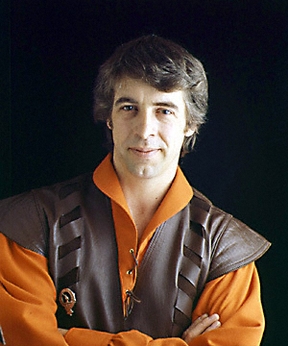The Corries were a Scottish folk group that emerged from the Scottish folk revival of the early 1960s. The group was a trio from their formation until 1966 when founder Bill Smith left the band but Roy Williamson and Ronnie Browne continued as a duo until Williamson's death in 1990.
"The Bonnie Earl o' Moray" is a popular Scottish ballad, which may date from as early as the 17th century.

Roy Murdoch Buchanan Williamson was a Scottish songwriter and folk musician, most notably with The Corries. Williamson is best known for writing "Flower of Scotland", which has become the de facto national anthem of Scotland used at international sporting events.

Ronald Grant Browne, known as The Voice, is a Scottish musician and songwriter, who is a founding member of The Corries.

The bandurria is a plucked chordophone from Spain, similar to the mandolin and bandola, primarily used in Spanish folk music, but also found in former Spanish colonies.
The "Mingulay Boat Song" is a song written by Sir Hugh S. Roberton (1874–1952) in the 1930s. The melody is described in Roberton's Songs of the Isles as a traditional Gaelic tune, probably titled "Lochaber". The tune was part of an old Gaelic song, "Òran na Comhachaig" ; from Brae Lochaber. The song describes fishermen sailing homeward to the isle of Mingulay where their families wait.

Peat Fire Flame is an album recorded in 1977 by The Corries, a Scottish folk group. The combolin is heard to advantage on "Come By the Hills". Williamson and Ronnie Browne are heard on the vocals. There is multi-tracking to include both men on guitars, Northumbrian pipes, harmonicas, whistles, flutes, concertina, mandolins, boranns, fiddle and combolins. The last four tracks are designed to be heard as one continuous track. Running time: 38 minutes 13 seconds.

Released in 1980, Stovies is the eighteenth album by The Corries. Recorded at one or more live concerts, most of the songs have spoken introductions. As well as two Jacobite folk songs written by the band, the release includes a tribute to Rob Roy.

The Corrie Folk Trio and Paddie Bell is the eponymous 1964 album by The Corrie Folk Trio and Paddie Bell.

The Promise of the Day is a music album by the band The Corrie Folk Trio and Paddie Bell. The album was produced in 1965 for the Scottish label Waverley Records. It was issued by the American label Elektra Records in 1966.

“On Fire” is the second CD released by Cape Breton's Celtic quartet, The Cottars. It was recorded at Lakewind Sound Studios in Cape Breton, Nova Scotia, and distributed by Warner Music. It was also released in Japan in 2004 by JVC Victor and followed by an extensive Japan tour. All the traditional songs and tunes were adapted and arranged by Allister MacGillivray and The Cottars and are published by Cabot Trail Music, SOCAN.
"Mairi's Wedding" is a Scottish folk song originally written in Gaelic by John Roderick Bannerman (1865–1938) for Mary C. MacNiven (1905–1997) on the occasion of her winning the gold medal at the National Mòd in 1934. In 1959, James B. Cosh devised a Scottish country dance to the tune, which is 40 bars, in reel time.

Pete Anderson is an American guitarist, music producer, arranger and songwriter.

Portrait of an American Girl is an album by Judy Collins, released in 2005.

Farewell and Remember Me is an album by The Boys of the Lough, released in 1987.
Sir Hugh Stevenson Roberton was a Scottish composer and, as founder of the Glasgow Orpheus Choir, one of Britain's leading choral-masters in the first half of the 20th century.
The Combolin was invented by Roy Williamson of The Corries in the summer of 1969. The combolin combined several instruments into a single instrument. One combined a mandolin and a guitar, the other combined guitar and the Spanish bandurria, the latter being an instrument Williamson had played since the early days of the Corrie Folk Trio.
"Roses of Prince Charlie" is a modern Scottish folk song composed by Ronnie Browne of The Corries. It was written circa 1973 and first appeared in their album released in 1974, Live From Scotland Volume 1. The title of the song refers to the symbol of Charles Edward Stuart, which was a white rose. The words represent Jacobitism and modern Scottish Nationalism.

Live from Scotland Volume 2 was a 1975 album by The Corries recorded at the Glasgow City Halls, Motherwell Town Hall, Dunfermline Carnegie Hall and Edinburgh Usher Hall, in 1974 and 1975.
The "Uist Tramping Song", "Null do dh'Uidhist" (Over to Uist) or "Tiugainn Leam" (Come With Me) is a traditional Scottish folk song, Gaelic lyrics by Archibald MacDonald, music by John R. Bannerman, arranged by Hugh S. Roberton. The song is an invitation to the sights and abundance of Uist, the central group of islands in the Outer Hebrides. The English language version tells of hiking there. Artists who have recorded this song include Kenneth McKellar, Robert Wilson and Robert Rees. Other notable recorded versions, include:












